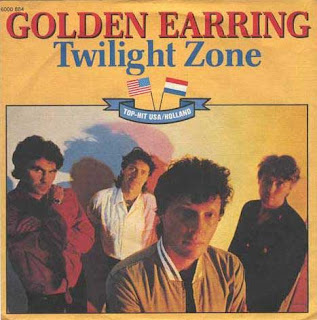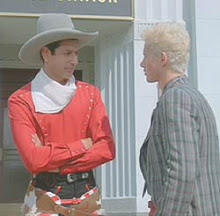
365. GOLDEN EARRING, "Radar Love"
Produced by Golden Earring; written by George Kooymans and Barry Hay
Track/MCA 40202 1974 Billboard: # 13
366. GOLDEN EARRING, "Twilight Zone"
Produced by Golden Earring; written by George Kooymans
21 Records 103 1982 Billboard: # 10
A quick one about Golden Earring--my favorite Dutch rock band!
Actually, Golden Earring is the only Dutch rock band I know, but I am honestly a fan of both these songs.
The former song is still ubiquitous on classic rock stations and shows up repeatedly in polls as one of the greatest driving songs of all time. When it comes to gearshifting, it's no "Call Me," but it certainly leaves the overhyped "Free Ride," for example, in the dust. In the immortals words of Stan Lee, nuff said.
As for "Twilight Zone," it's part of that great unappreciated genre of late Cold War pop spy thrillers, which I hope to do a post on at some later date.
 If you lived through early MTV, you probably have the visuals for the video of this song seared into your brain, but I for one am rather pleased that I can listen to it now without automatically thinking of pre-Robert Palmer trenchcoated supermodel types. It's a great little gnarled thriller--but it should have been called "When the Bullet Hits the Bone," since that's the phrase I always come away chanting after each time that I hear it.
If you lived through early MTV, you probably have the visuals for the video of this song seared into your brain, but I for one am rather pleased that I can listen to it now without automatically thinking of pre-Robert Palmer trenchcoated supermodel types. It's a great little gnarled thriller--but it should have been called "When the Bullet Hits the Bone," since that's the phrase I always come away chanting after each time that I hear it.In both cases, though, what really stays with me is the perfect snarl of group founder George Kooymans. Has there ever been a European pop star who sounded so unquestionably American? It's that primordial stew of global pop again, making America European and Europeans American. Hearing him howl for Brenda Lee or archly note that "It's 3 a.m, the gun is still warm," I find it hard to believe Kooymans actually grew up in the Netherlands.
He did, of course, but like every other postwar kid in Western Europe, he apparently sucked up every facet of American culture he could. And anyway, Americans don't snarl like that in real life, just in the movies and on pop records.


